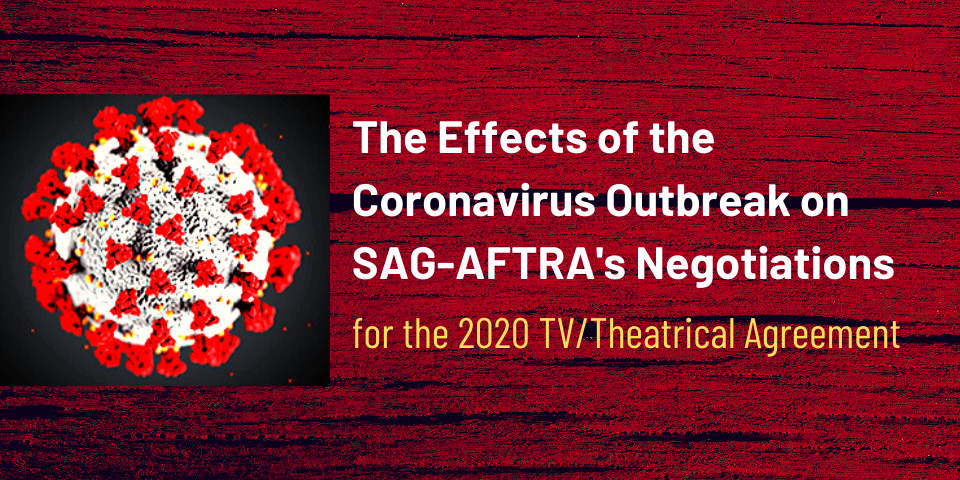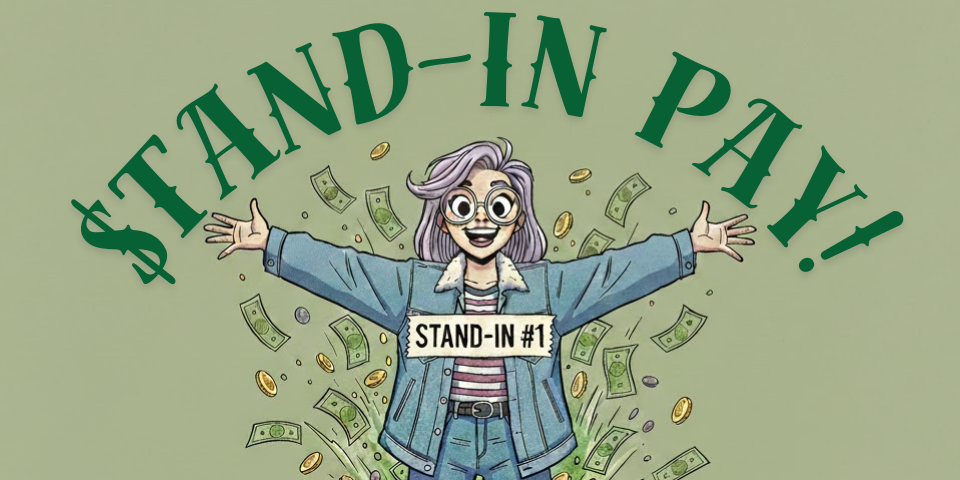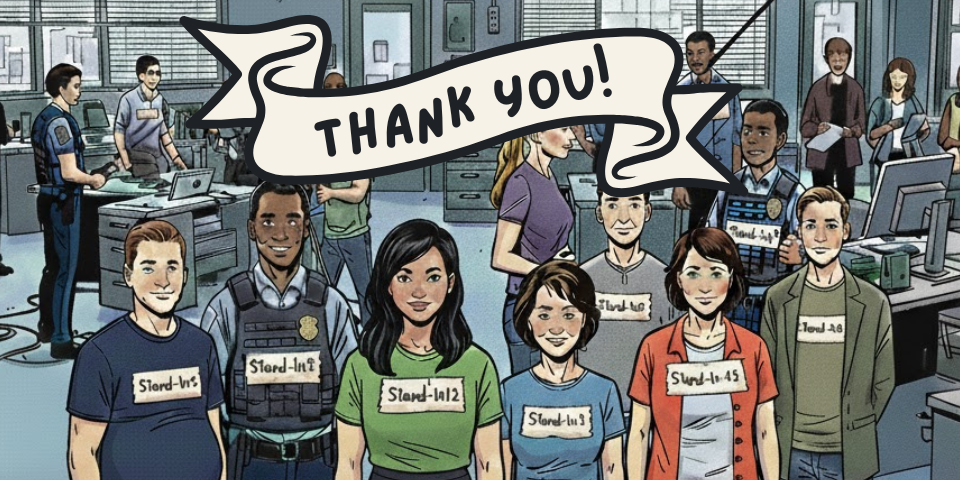This post is part of Stand-In Central’s deep-dive series into the coronavirus pandemic as it relates to stand-in work in TV and film. For more posts in the long-running series, visit http://standincentral.com/coronavirus.
— The Editor
As SAG-AFTRA’s TV/Theatrical Agreement is set to expire on June 30, 2020, SAG-AFTRA and the AMPTP have been due to negotiate later this spring — potentially as early as May but perhaps more plausibly in June.
SAG-AFTRA already approved its bargaining package in July 2019, meaning that the bargaining package could not have referenced COVID-19 and the devastating effects it has already had on SAG-AFTRA’s work force, much less the entertainment industry as a whole.
If SAG-AFTRA does not decide to reevaluate its 2019-approved bargaining package, then SAG-AFTRA members should not likely expect any agreement between SAG-AFTRA and the AMPTP that immediately and specifically addresses the industry disaster brought on by COVID-19.
What SAG-AFTRA’s 2020 TV/Theatrical Bargaining Package Will Look Like
To this point, SAG-AFTRA’s negotiators are bringing to the bargaining table what looks to be a relatively small amount of proposals for negotiation of a successor agreement to the TV/Theatrical Agreement.
The Wages & Working Conditions process (aka the “W&Ws”) provided SAG-AFTRA members the opportunity to contribute ideas for negotiation in late spring 2019. In that 2019 process, all of the SAG-AFTRA locals provided the SAG-AFTRA national W&W Committee with bargaining proposals. In total, the SAG-AFTRA locals provided 147 bargaining proposals for negotiation in 2020. Just 20 of those proposals were then submitted to SAG-AFTRA’s National Board, which approved them with “minor changes” on July 20, 2019.
In other words, only 13% of SAG-AFTRA locals’ bargaining proposals were submitted to the SAG-AFTRA National Board (20 of 147), and the National Board approved those 13% but altered one or more of the members’ bargaining proposals. Arguably, given the minor changes, less than 13% of SAG-AFTRA locals’ bargaining proposals were accepted by the SAG-AFTRA National Board for 2020 negotiations.
With respect to the SAG-AFTRA New York local, the New York local provided 23 bargaining proposals for the 2020 negotiations to the national W&W Committee. Only 4 were submitted to the SAG-AFTRA National Board. That means only 17% of the New York local’s proposals were submitted to and accepted by the SAG-AFTRA National Board.
Considering the amount of television and film work that the New York City area has, one has to wonder what those 4 bargaining proposals from the New York local are and whether more New York proposals should have been submitted to the SAG-AFTRA National Board.
And certainly those bargaining proposals do not deal with the disaster specifically brought on by COVID-19. With New York City currently being regarded as one of the areas most ravaged by COVID-19, one has to wonder whether New York City SAG-AFTRA members need more than 4 bargaining proposals that have nothing to do with the coronavirus at the 2020 negotiations.
Status of 2020 Negotiations
As of this writing, it is unclear whether SAG-AFTRA and the AMPTP will meet to negotiate before the expiry of its collective bargaining agreement on June 30, 2020.
On March 24, the Writers Guild told its members that its negotiations for a new collective bargaining agreement with the AMPTP did not start on the planned date of March 23. The WGA’s contract expires on May 1, 2020, which is two months before SAG-AFTRA’s respective contract does.
There is no indication as of this writing that the WGA has formally asked to extend its contract, but rather that it is figuring out negotiation logistics given the shelter-in-place orders brought on by the coronavirus pandemic.
The WGA is also figuring out logistics no doubt given that approximately 100 negotiators take part in bargaining, some flying from COVID-19-ridden New York City to Los Angeles. With the CDC advising social distancing and limiting “events and meetings that require close contact,” it seems that any in-person negotiations would be unwise. But without an in-person aspect to negotiations, it may be technically difficult to pull off effective negotiation.
In the interim, the WGA has advised its members that it may negotiate past the May 1 expiry. It has also said it would not be asking them for a strike authorization (at least for now), and that they may continue to work past May 1 if no agreement is made by then. Without asking for a strike authorization from their members, the WGA may have a harder time at the bargaining table against the AMPTP.
No doubt, the AMPTP producer-members are hurting, too, so they don’t want to deal with a writers strike now. But with the WGA decidedly not asking for a strike authorization in the immediate future, the AMPTP may end up with the upper hand in the WGA negotiations.
SAG-AFTRA’s 2020 Negotiations
If the recent actions in the past week by the Writers Guild are any indication, SAG-AFTRA is trying to figure out what to do.
No doubt it is managing the crisis that many of its members are suddenly out of work and may very well be out of work for a very long time. The implications are not just on members’ pocketbooks, but also on their health and future well-being, as the loss of work and the overall economic turbulence affects their qualifications for health insurance and pension credits. (SAG-AFTRA is also managing the crisis its own employees are facing. Of note, SAG-AFTRA’s headquarters has closed because of the pandemic.)
But SAG-AFTRA no doubt is also figuring out how to go about 2020 negotiations that are coming up. Plausibly these negotiations would start in June 2020, and at this point in the coronavirus pandemic, it is too hard to say where the country will be in June with respect to the outbreak and its spread, the wisdom of negotiating in person, and whether the AMPTP is even in a position to negotiate. For example, if the WGA pushes far past its May 1 expiry in its own negotiations, presumably that could mean that the AMPTP is not available to negotiate with SAG-AFTRA.
Whatever the case, things do not look good for SAG-AFTRA members in the upcoming negotiations, which will likely be for a three-year successor agreement to the 2017 TV/Theatrical Agreement. SAG-AFTRA is walking into the room with about 20 bargaining proposals, and forsaking 127 bargaining proposals that the locals’ members recommended. That fact already potentially translates to member frustration, when those recommending groups of SAG-AFTRA members don’t see their proposals in the successor agreement (and maybe learn they were never even negotiated).
But members who were working, and who now are not working because of the COVID-19 pandemic, will be at a scramble for work. Hypothetically, there will be less work. Production won’t suddenly turn back on en masse with some “all clear,” and everyone will go back to work and have an acting or stand-in job. In all likelihood, productions will start back up gradually, carefully, to measure whether there is a potential for more outbreak that could shut them down again.
And productions will just try to hire fewer people. Because of the hit the industry has taken, there may be less money to spend on actors — or productions for that matter. And at that, it may be dangerous to spend on lots of actors. So stunts, stand-ins, and background actors may see less work coming out of this, in competition with all of the others who have suffered without work and are seeing less work.
This potential situation translates to SAG-AFTRA members’ being desperate for work and unlikely to approve a strike authorization if the union asked for one. In other words, the AMPTP can stand very firm against SAG-AFTRA in negotiations, and with no strike authorization from its members, SAG-AFTRA may have to give in to the AMPTP’s uglier or more offensive demands.
In such an event, SAG-AFTRA no doubt will try to spin the impressive amount of gains they achieved in these “extraordinary” negotiations, and it will tell its members to “Vote Yes!” on the successor agreement it eventually achieves. But if you read the package (or maybe what is left out of it), it is perhaps predictable that the AMPTP will really hurt SAG-AFTRA members at the bargaining table later in 2020.
Then again, maybe not. Maybe this is the time that SAG-AFTRA will really take a stand for its members in light of these incredible and sad times. Perhaps it will see the pinch the union and its members are in, and it will fight so much harder for SAG-AFTRA members as a result.
A Time to Be Vigilant over SAG-AFTRA’s Actions?
In an unprecedented move, SAG-AFTRA reorganized its authority structure in light of the challenges of the coronavirus outbreak.
SAG-AFTRA’s 80-member board was understandably challenged to meet, so it recently voted to delegate “all” of its authority to its smaller executive committee. The move makes sense, but it also sounds potentially dangerous for SAG-AFTRA to do so, putting the union leadership in the hands of fewer (38) people.
As to the danger to SAG-AFTRA members, the SAG-AFTRA board delegated to the executive committee the authority to approve contracts like the TV/Theatrical Agreement that is coming up. And some of the executive committee may also be on the negotiating committee. (I do not know offhand; add a comment if you can confirm or deny that.)
In that event, it may be that the negotiating committee has less persuading to do about the achievements it negotiated in the 2020 TV/Theatrical Agreement negotiations, because part of that negotiating committee would also be on the executive committee. This lack of a “board check” on the successor agreement the negotiating committee achieves means SAG-AFTRA members aren’t as well protected from the interests of the negotiating committee (which may diverge from individual member interests, for one).
In other words, without a board to vote down (or to voice dissent against) a 2020 successor agreement, and with some of the negotiating committee presumably also on the executive committee, a controversial and disagreeable successor agreement may be unsurprisingly handed to SAG-AFTRA members.
We shall see.
A Time for the Worker
An extraordinary number of workers are out of work across the country because of the coronavirus pandemic.
This is a time when the focus is on the worker, more than the employer.
Consider whether what SAG-AFTRA achieves in its 2020 negotiations with the AMPTP is more focused on the worker than on the employer.
And don’t be fooled into thinking that because SAG-AFTRA is a labor organization comprised of workers, what it achieves will naturally be focused on the worker.
Instead, look at what SAG-AFTRA actually achieves, and what it gives away, then ask yourself whether what it achieves is worker-focused.
Thoughts? Opinions? Corrections? Predictions? Post in the comments section below!
Discover more from Stand-In Central
Subscribe to get the latest posts sent to your email.







Ben, It’s my understanding that nobody is paying you to do this research and write these articles for us. Thank you so much for your commitment to the worker, and for taking the long view. In this case, the long view is a few months from now. Most of us are reeling from what is happening to us today, with the official coronavirus case numbers surpassing those of other countries on this day (March 26, 2020), but you seem to have your wits about you enough to look beyond and at least to try to see a bigger picture. So much is changing right now, it’s very hard to call anything at all. But historically, I feel that actors have been getting less and less, and the disparity between the rich and poor has intensified, and it’s mimicking what’s going on in the rest of the country and the world.
Jenny, thank you for your comments. It is helpful in my opinion to publish these kinds of thoughts and feelings about our situations, so we can measure our abilities to predict the future when the future does come. I say this so that we can better figure out how good or bad we may be at predicting. So we shall see what happens and see if we predicted things based on what we know or think wr know.